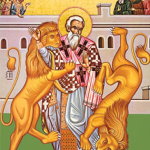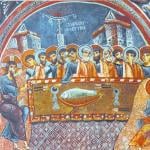
Over at Patheos, the Future of Catholicism Week continues. Today I was struck by the enthusiasm and optimism of Word on Fire’s Fr. Robert Barron, as he offers some advice to young priests:
Who, after all, would want to sign up for a form of life that was regularly subjected to bitter critique and that seemed, in the eyes of many, to be dysfunctional? And yet you came, and you stayed.
No one could possibly accuse you of seeking an easy life or hiding from your problems. Your very presence and perseverance in the seminary constituted, therefore, a vivid sign that God stubbornly, in season and out, calls people to the priesthood. Don’t lose the love that brought you to the seminary, or the grace that saw you through it during a remarkably dark time; instead, deepen the love, broaden it, strengthen it through that grace.
[…]
Your priesthood has a great assist in the accessibility of communications technology that men like Billy Graham or Fulton Sheen would have embraced and quickly mastered, to powerful effect. Take advantage of all of this; seize it for the sake of the Gospel. Jesus told us to preach to “all the nations,” and Vatican II specified that that the primum officium (first duty) of the priest is to proclaim the Word. Today the average parish priest has the capacity to get the message out 24/7, all around the world. Use new media pro-actively; let the Holy Spirit guide you to the allurement of God’s people — as in Hosea 2:14 — in bold and sanctifying contrast to the vast wasteland that clutters the mind and warps the soul.
You’ll want to read the whole thing, and check out the other essays, if you haven’t yet.
And don’t forget the symposium; some internet folk you’ll recognize there, each day. Here are today’s blurb-sized musings.
Related: Since the abysmal scandals of the church loom large through much of these essays, you might also want to read R. R. Reno’s piece at First Things: After the Scandals. He is, sadly, not as optimistic as others:
I don’t think, however, that the Catholic hierarchy has grasped the sociological and institutional consequences of counter-cultural status. If you’re not a player, you’re much more vulnerable: more vulnerable to being flayed by public opinion, more vulnerable to journalistic Jihads, more vulnerable to politically aware governmental officials who see that skewering bishops can advance careers, more vulnerable to angry protesters and bitter victims.
So, yes, of course the Catholic Church has brought the current scandals upon herself, with a great deal of blame going to the hierarchy. But the social impact, the lasting consequences, the feeling that a great deal it in peril? No, it’s not a function of sin within the Church, however horrifying the sexual abuse might be on its own terms. Instead, the scandals reveals a change that is part of a realignment within European societies.
Put simply: the Church has become largely disestablished on the ground, with few going to church (a social reality the consequences of which were masked, perhaps, by the remarkable charisma of John Paul II), and therefore it can no longer retain the privileges of social establishment, one of the most important of which is protection from debilitating criticism.
If I’m right about the larger dynamics at work in the current round of scandals, the Church is in for a tough season. The expulsion from the elite makes her leaders supremely vulnerable.














